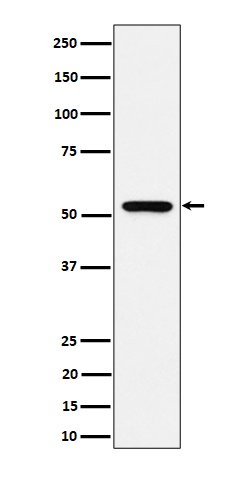Anti-GRSF1 Rabbit Monoclonal Antibody
- SPECIFICATION
- CITATIONS
- PROTOCOLS
- BACKGROUND

Application
| WB, IHC, IF, ICC, FC |
|---|---|
| Primary Accession | Q12849 |
| Host | Rabbit |
| Isotype | IgG |
| Reactivity | Human |
| Clonality | Monoclonal |
| Format | Liquid |
| Description | Anti-GRSF1 Rabbit Monoclonal Antibody . Tested in WB, IHC, ICC/IF, Flow Cytometry applications. This antibody reacts with Human. |
| Gene ID | 2926 |
|---|---|
| Other Names | G-rich sequence factor 1, GRSF-1, GRSF1 |
| Calculated MW | 53 kDa |
| Application Details | WB 1:500-1:2000 IHC 1:50-1:200 ICC/IF 1:50-1:200 FC 1:50 |
| Contents | Rabbit IgG in phosphate buffered saline, pH 7.4, 150mM NaCl, 0.02% sodium azide and 50% glycerol, 0.4-0.5mg/ml BSA. |
| Clone Names | Clone: 30G49 |
| Immunogen | A synthesized peptide derived from human GRSF1 |
| Purification | Affinity-chromatography |
| Storage | Store at -20°C for one year. For short term storage and frequent use, store at 4°C for up to one month. Avoid repeated freeze-thaw cycles. |
| Name | GRSF1 |
|---|---|
| Function | Regulator of post-transcriptional mitochondrial gene expression, required for assembly of the mitochondrial ribosome and for recruitment of mRNA and lncRNA. Binds RNAs containing the 14 base G- rich element. Preferentially binds RNAs transcribed from three contiguous genes on the light strand of mtDNA, the ND6 mRNA, and the long non-coding RNAs for MT-CYB and MT-ND5, each of which contains multiple consensus binding sequences (PubMed:23473033, PubMed:23473034, PubMed:29967381). Involved in the degradosome-mediated decay of non- coding mitochondrial transcripts (MT-ncRNA) and tRNA-like molecules (PubMed:29967381). Acts by unwinding G-quadruplex RNA structures in MT- ncRNA, thus facilitating their degradation by the degradosome (PubMed:29967381). G-quadruplexes (G4) are non-canonical 4 stranded structures formed by transcripts from the light strand of mtDNA (PubMed:29967381). |
| Cellular Location | [Isoform 1]: Mitochondrion matrix Note=Localizes to mitochondrial RNA granules found in close proximity to the mitochondrial nucleoids. |

Thousands of laboratories across the world have published research that depended on the performance of antibodies from Abcepta to advance their research. Check out links to articles that cite our products in major peer-reviewed journals, organized by research category.
info@abcepta.com, and receive a free "I Love Antibodies" mug.
Provided below are standard protocols that you may find useful for product applications.
If you have used an Abcepta product and would like to share how it has performed, please click on the "Submit Review" button and provide the requested information. Our staff will examine and post your review and contact you if needed.
If you have any additional inquiries please email technical services at tech@abcepta.com.













 Foundational characteristics of cancer include proliferation, angiogenesis, migration, evasion of apoptosis, and cellular immortality. Find key markers for these cellular processes and antibodies to detect them.
Foundational characteristics of cancer include proliferation, angiogenesis, migration, evasion of apoptosis, and cellular immortality. Find key markers for these cellular processes and antibodies to detect them. The SUMOplot™ Analysis Program predicts and scores sumoylation sites in your protein. SUMOylation is a post-translational modification involved in various cellular processes, such as nuclear-cytosolic transport, transcriptional regulation, apoptosis, protein stability, response to stress, and progression through the cell cycle.
The SUMOplot™ Analysis Program predicts and scores sumoylation sites in your protein. SUMOylation is a post-translational modification involved in various cellular processes, such as nuclear-cytosolic transport, transcriptional regulation, apoptosis, protein stability, response to stress, and progression through the cell cycle. The Autophagy Receptor Motif Plotter predicts and scores autophagy receptor binding sites in your protein. Identifying proteins connected to this pathway is critical to understanding the role of autophagy in physiological as well as pathological processes such as development, differentiation, neurodegenerative diseases, stress, infection, and cancer.
The Autophagy Receptor Motif Plotter predicts and scores autophagy receptor binding sites in your protein. Identifying proteins connected to this pathway is critical to understanding the role of autophagy in physiological as well as pathological processes such as development, differentiation, neurodegenerative diseases, stress, infection, and cancer.


